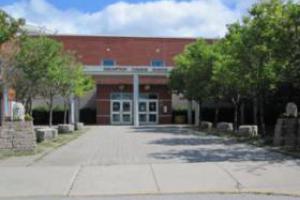Special Education
Introduction
The Special Education Department works with parents, teachers, school staff and community partners to provide a variety of options and pathways for all students. We provide services and supports for students in all classes, assisting with the development of an Individual Education Plan. We help in determining student goals and provide resources and support to aide in student success.
The Special Education Department advocates for the needs of exceptional students and all students can access supports through The Learning Centre or the Student Wellness Centre. Assumption also provides a variety of programming options for students that require alternative programming.
The Special Education Department at Assumption is here to support all learners to find success in high school.
The Brant Haldimand Norfolk Catholic District School Board strives to meet the educational needs of all learners at the secondary level. The Special Education Department is committed to meeting the needs of all students to ensure they reach their full potential.
The Special Education Department offers three specific alternative programs for identified students to support academic, vocational, spiritual and personal growth. These programs are designed to prepare students for independent or supported living and employment settings.
Our Three Alternative Programs
Personal Active Learning Program (PAL)
Community Living Program
Job Skills Program
The Benefits of These Programs
- Smaller class size with support personnel
- Instruction and practice of appropriate social skills
- Functional literacy and numeracy instruction
- Consistent, regular routines
- Integration opportunities within the school and/or community
- Individualized programming based on students’ strengths and needs
- Highly structured environment that promotes independence and confidence
- Consistent classroom behavioural expectations
- Opportunity to practice skills learned through experiential learning
Personal Active Learning Program (PAL)
This program is designed for students in a non-credit program with intensive supports to enhance student learning.
Alternative courses in this program are aimed at developing functional academics, self-help skills, functional communication, daily living skills, motor skills, and choice making. Students are taught using a multi-sensory approach which includes ABA strategies and opportunities for experiential learning.
Criteria for placement in the PAL Program:
- Non-independent
- Identification of one or more of the following: Developmental Disability, Autism Spectrum Disorder and/or multiple complex needs in one or more of the following: Communication, mobility, academics, medical, social and self-care skills
Features of the PAL Program:
- A class size of eight (8) students
- Extensive support of educational assistants
- A self-contained environment with planned and supported integration opportunities within the school
- If required, access to system support staff including Speech-Language Pathologists, Social Workers, Orientation and Mobility, Itinerant Teacher of the Deaf and Hard of Hearing and ABA Leads
- A close liaison with partnering agencies regarding student programming and coordination of community services
Community Living Program
This program is designed for students in a non-credit program whose ultimate post-secondary goal is to seek supported living and supported employment in the community.
Criteria for placement in the Community Living Program:
- Partially independent – needs some supervision
- Identification of one or more of the following: Developmental Disability, Autism Spectrum Disorder and/or Multiple
- Moderate needs in one or more of the following: receptive and expressive language, mobility, social, academics and medical
- Liaison with partnering agencies regarding programming and coordination of community services where appropriate
Features of the Community Living Program:
- A maximum of twelve (12) students
- Support of educational assistant(s)
- If required, access to system support staff including Speech-Language Pathologists, Social Workers, Orientation and Mobility, Itinerant Teacher of the Deaf and Hard of Hearing and ABA leads
- An environment with planned and supported integration opportunities within the school
Job Skills Program
This class is designed for students in a non-credit program whose ultimate post-secondary goal is to continue education and/or seek independent living and employment. The program offers students an opportunity to obtain credit courses or courses combined with on-the-job training.
Criteria for placement in the Job Skills Program:
- Independent other than physical needs, (e.g. personal care) due to a medical condition
- Identification of one or more of the following: Mild Intellectual Disability, Autism Spectrum Disorder and/or Multiple
- Minor needs in receptive and expressive language, mobility, social, academics and medical
Features of the Job Skills Program:
- A maximum of sixteen (16) students
- Support of an educational assistant
- Liaison with partnering agencies regarding programming and coordination of community services where applicable
- An environment that will allow for planned integration opportunities in locally developed and other credit courses.







